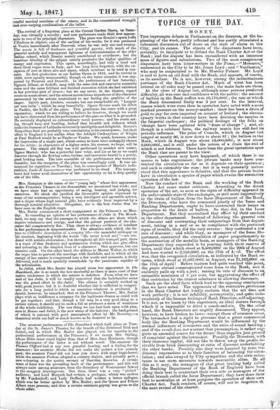The revival of a forgotten piece at the Covent Garden
Opera, on Satur- day, was virtually a novelty; and new performers made their first appear- ance in two of its principal characters. The piece was Rossini's opera buffs L'Italiana in Algieri; one of the earliest of his works, for it was produced at Venice immediately after Tnncredi, when he was only one-and-twenty. The music is full of freshness and youthful gayety, with much of the graceful melody and transparent lightness of instrumentation of the older Italian school, which Rossini mainly contributed to overthrow; but the heartless frivolity of the subject utterly precludes the higher qualities of energy and expression. This opera, accordingly, had only a local and short-lived vogue even in Italy, and has long been forgotten, with the ex- ception of two or three airs and duets, which continue to be used at con- certs. Its first production at our Italian Opera in 1819, and its revival in 1829, were equally unsuccessful; though on the latter occasion it was sup- ported by Pesaroni and Donzelli. In the performance of last Saturday, Signora Alboni, as Isabella, sang with the same rich and extensive contralto voice and the same brilliant and finished execution which she had exhibited in her previous part of Armee: but we can never, in the theatre, regard music as music alone; and the almost meretricious impudence of the character personated by the actress neutralized to our feeling the qualities of the singer. Salvia part, Lindoro, contains but one remarkable air, " Languir per Lula bells"; which he sang beautifully. Signor Rovere made his dant as Taddeo, the buffo of the piece. This gentleman has come with a great reputation; which we are willing to believe he deserves, though we could not have discovered from his performance of this part on what it is grounded. He certainly displayed no extraordinary vocal powers; and his comic act- ing, though busy and bustling, lacked that breadth and richness which make the humour of Lable.che universally intelligible and delightful. Rovere's Neapolitan lazzi are probably very entertaining to hisvonntrymen ; but their effect in England is not unlike what the Adelphi Cockneyisms of Wright or Paul Bedford would he at Naples or Venice. We speak, however, under the impression of a single part, which seems to have been unhappily chosen for his


























 Previous page
Previous page